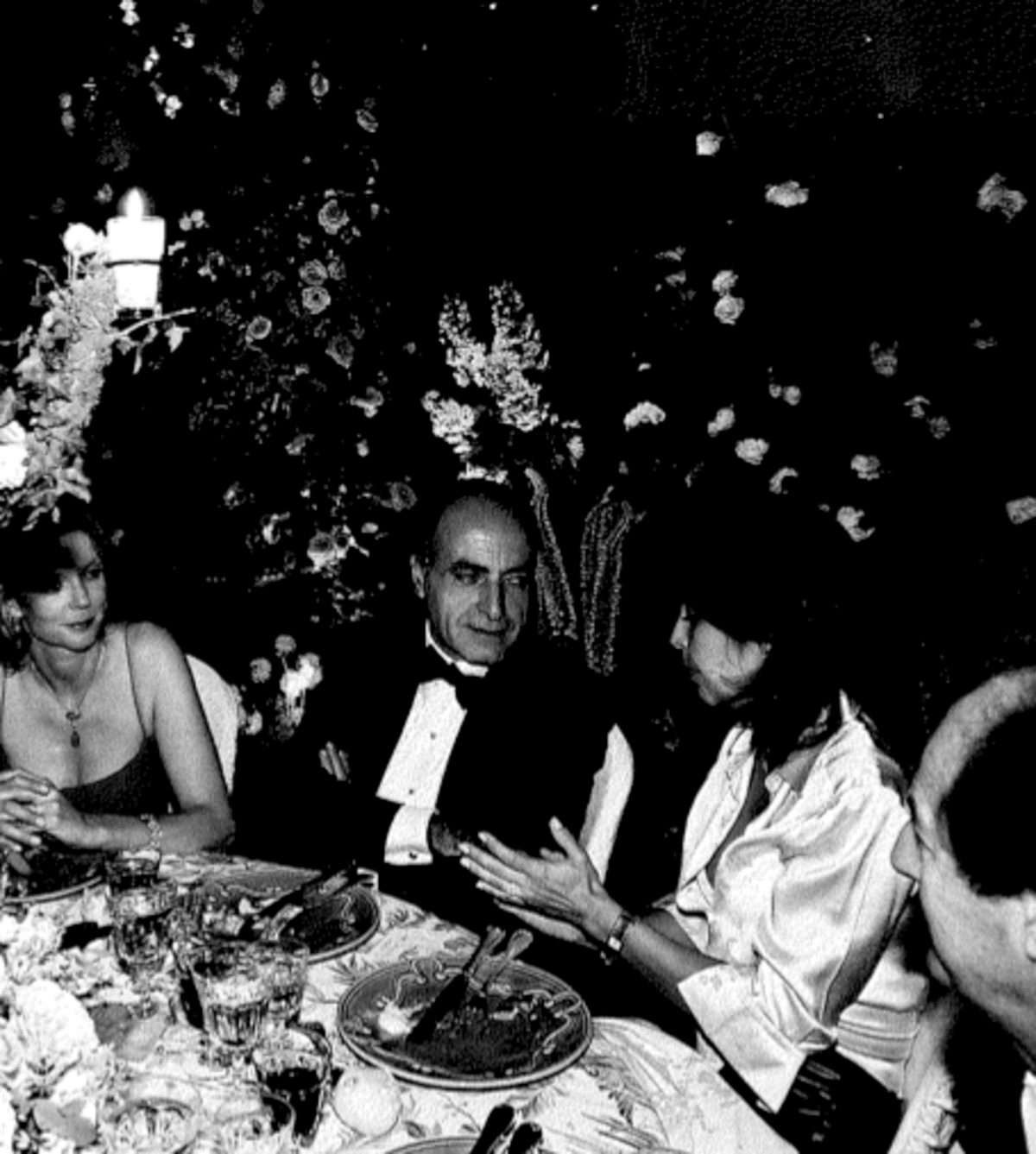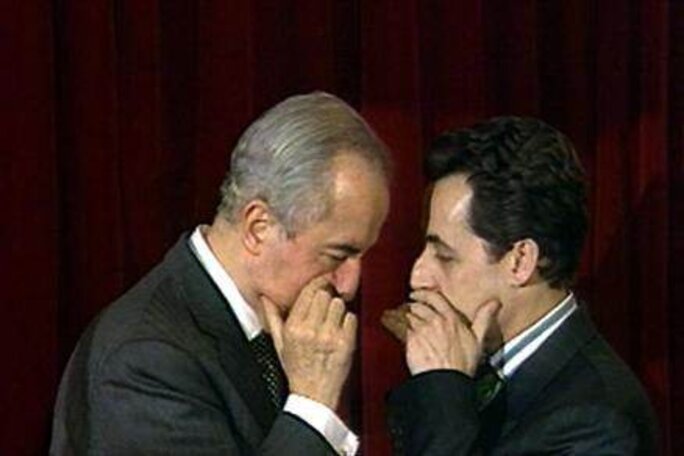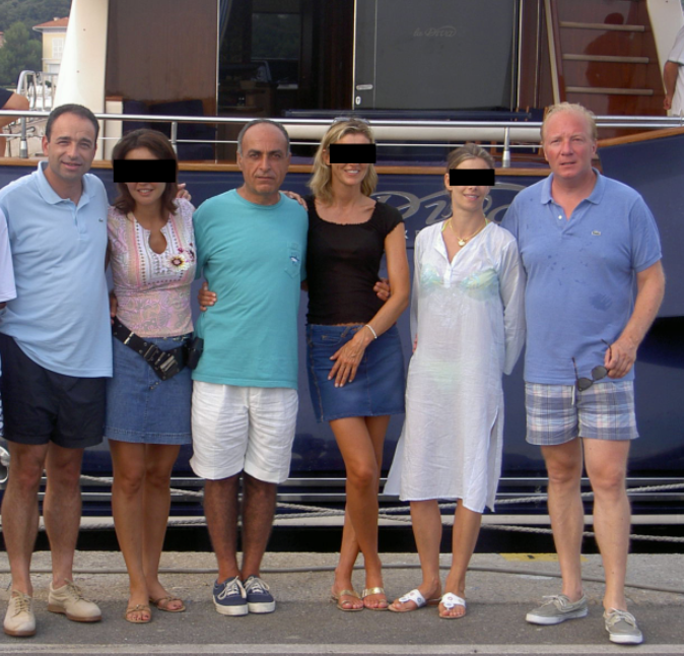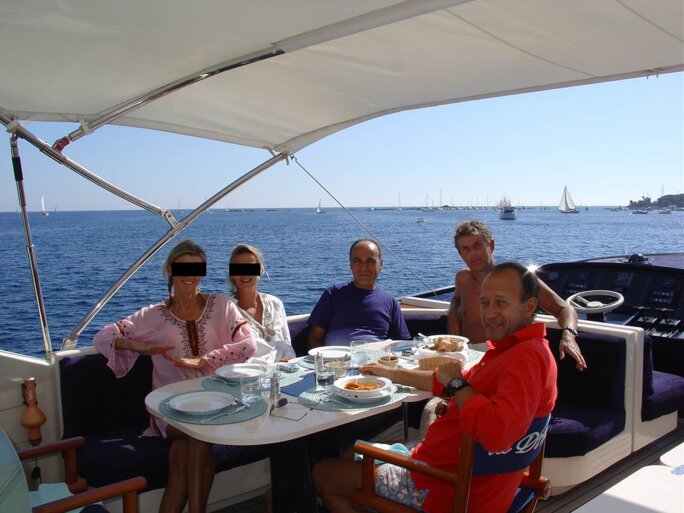In a series of exclusive reports that began in July, Mediapart has revealed the long-standing close links between France-based businessman and arms dealer Ziad Takieddine and the inner circle of advisers and aides surrounding Nicolas Sarkozy, before and after he became French president. Here, Fabrice Arfi and Karl Laske reveal how the businessman's financial and property assets have been frozen ahead of his imminent divorce and assess what the implications are for the investigation into the Karachi affair.
-------------------------

Written and photographic documents exclusively obtained by Mediapart have demonstrated the very close and longstanding links, both professional and social, between Takieddine and Nicolas Sarkozy's immediate entourage. Mediapart has revealed how Paris-based Takieddine surprisingly pays no income nor wealth tax in France, his fiscal domicile and where, according to documents signed by him, his personal fortune has an estimated value of more than 40 million euros.
Mediapart has further shown how in 2003 Takieddine was destined to receive 350 million euros in secret commissions from another arms contract, this time with Saudi Arabia, negotiated on behalf of Nicolas Sarkozy's aides via a company run by the French interior ministry when it was headed by Sarkozy. Mediapart has also disclosed how the arms dealer, while negotiating that contract, was saved by Sarkozy's entourage after an alleged assassination attempt on the exclusive Caribbean island of Mustique.
The investigations have also shown how Takieddine served as a protector for Colonel Muammar Gaddafi's nephew Mohammed al-Senussi after he was charged in London with causing ‘grievous bodily harm' to two escort girls and how the businessman, backed by Sarkozy's Elysée Palace chief-of-staff, was paid almost 7 million euros by oil group Total in a gas field deal with Gaddafi's regime. French intelligence has also been shown to have been shielding the arms broker.
Now Mediapart can reveal how the businessman's private life has halted his attempts to reorder his financial affairs.
Takieddine has recently been seeking to sell off his estate and "exfiltrate" the bulk of his fortune, which is already managed by offshore trust companies domiciled in several different tax havens.
On August 4th, however, family law court justice Myriam Cadart temporarily froze his property holdings and personal assets at the request of Nicola Johnson, 50, his estranged British wife who is now divorcing him, in view of "the certain and imminent risk of dissipation of the couple's estate".
At the same time, investigating magistrate Renaud Van Ruymbeke instructed the police to question Mrs Johnson about the commissions her husband had received on the sale of French arms to Pakistan and Saudi Arabia, which constitutes the nub of the financial side of the ‘Karachigate' affair. The arms broker's wife was called in for questioning on August 30th by the DNIF financial crime division in the Paris suburb of Nanterre.
While the Paris court of appeal is to rule on the divorce proceedings on September 15th, William Bourdon, Mrs Johnson's lawyer, on August 4th obtained a temporary injunction from the family law judge "prohibiting Mr Ziad Takieddine from engaging in any act whatsoever to dispose of any of their community property".
This injunction expressly applies to Takieddine's prestigious Paris apartment in the avenue Georges-Mandel, his properties in the French town of Antibes and in London - which, as Mediapart has revealed, he withheld from the tax authorities - as well as other apartments in Paris (rue Marbœuf) and Beirut.
Solicitor William Bourdon has communicated this injunction, which amounts to a freeze on Takieddine's assets, to "roughly two hundred legal entities" directly concerned, including the offshore companies whose chief raison d'être was to receive payment of - and share out - the illegal commissions on the arms deals.
"Mr Takieddine, who is known worldwide for the extremely opaque nature of his business dealings and his sundry connections, which have been widely denounced and relayed by the press," wrote Bourdon in his August 4th request to the court, "hid his income and various properties for many years."
"Mrs Johnson found out that he had already sold some of their properties," continues the brief, "and that he was making arrangements to sell others, taking out additional mortgages and loans, and thereby severely diminishing her chances of being awarded any compensatory allowance under the terms of their divorce."
Justice Van Ruymbeke on the track of the arms broker
Based on a "breakdown of her husband's real and movable properties", Nicola Johnson estimates the couple's overall estate at about 104,036,000 euros. In a document revealed on July 12th by Mediapart, Takieddine himself put his total real estate holdings at 97.2 million euros. The estimated value of his properties in France alone comes to 40 million euros. His estranged wife is demanding 25 million euros in the divorce suit.
Her lawyer put extra emphasis in his request on the "highly sophisticated system" Takieddine set up "to hide his income and real assets from the French authorities as well as from his wife". "For a long time he has claimed most of his properties did not belong to him and that he had only temporary use thereof by virtue of an employment contract," Bourdon added.

This concealment, an inherent feature of the arms broker's missions, began in 1994 and 1995 when the government under prime minister Édouard Balladur foisted him on the industrialists involved to serve as middleman in the arms deals that were already on the verge of being signed. Having made his fortune, even though some of the contracts were subsequently cancelled on President Jacques Chirac's orders in 1996, he continued serving as the principal go-between for Nicolas Sarkozy's entourage from 2002, reporting to the new president's chief of staff, Claude Guéant, as Mediapart has shown in this article and this one.

Enlargement : Illustration 3

In July the revelations of Ziad Takieddine's ties to Brice Hortefeux and Jean-François Copé induced Olivier Morice, counsel for the families of the Karachi bombing victims, to petition Justice Renaud Van Ruymbeke to question these two conservative party leaders, who had been frequent guests on Takieddine's yacht.
On December 14th 2010, justices Renaud Van Ruymbeke and Roger Le Loire launched a preliminary investigation for "misappropriation of corporate assets, complicity and concealment" regarding the contracts signed by Ziad Takieddine and one of his partners, Abdul Rahman el-Assir, with the French naval defence contractor DCNI for the sale of Agosta submarines to Pakistan, and with SOFRESA, an arms exporter run by the French defence ministry, for the sale of the frigates to Saudi Arabia.
Shortly thereafter, Van Ruymbeke sent letters rogatory to Switzerland concerning the offshore companies named in DCNI's records of the Pakistan deal. He also asked - in vain - for access to the French budget ministry's tax records, which should at the very least show the names of the declared brokers of each separate deal.
Some of the searches requested had already been carried out. On June 10th 2010, within the extended scope of the investigation of the Karachi bombing, the investigating officers from the DNIF financial crime division conducted a thorough search of Ziad Takieddine's residence in the avenue Georges-Mandel, where they found "no object or document likely to be of interest in the ongoing investigation". However, the detectives did make a copy of Takieddine's iPhone directory, which shed some interesting light on his entourage.
Takieddine's lies to the court

Enlargement : Illustration 4

The iPhone contacts included a number of prominent people. Thierry Gaubert, who was a close aide to Nicolas Sarkozy during the latter's stints as mayor of the wealthy Paris suburb of Neuilly and as French finance minister. Claude Guéant, Sarkozy's trusty chief of staff and current interior minister. Brice (and wife Valérie) Hortefeux, the president's erstwhile right-hand man, former minister of the interior and immigration. Abdullah Senussi, Gaddafi's brother in law and Libyan secret service chief [Editor's note: now wanted by the International Criminal Court for crimes against humanity], and his son Mohammed Senussi. Etienne Mougeotte, editor of the conservative French daily Le Figaro.
But the directory also includes contact information for Christophe de Margerie, CEO of the French oil giant Total, who signed off on commission payments to Takieddine, and Jean-François Arrighi, head of North Africa operations for the Total Group. Philippe Vannier, CEO of the Bull Group, who worked with Takieddine on handling the sale of encryption equipment to the Libyan regime to keep its communications under the Western radar. And Charles Villeneuve, a journalist friend of Takieddine's and one-time mainstay of the right-leaning, popular French TV network TF1.

So Ziad Takieddine, now targeted directly by the investigation into the financial side of the Karachigate affair, has for several months been expecting Justice Van Ruymbeke to call him in for questioning. Before Mediapart began publishing this series of articles on the "Takieddine Documents", the arms broker had already given the courts two different versions of his secret activity.
Twelve years ago, on November 5th 1998, he was questioned under letters rogatory from Justice Eva Joly in the money-laundering affair involving the liberal-conservative Republican Party and its former leader, François Léotard. He admitted having introduced a Saudi dignitary, Sheikh Ali Bin Mussalam, to prime minister Édouard Balladur's cabinet and to then defence minister François Léotard, whom he acknowledged as a personal acquaintance. But he denied having been in the know about any arms deal, in particular the sale of the frigates to Saudi Arabia (under the so-called "Sawari 2 contract").
Takieddine said he had confined himself to attending "three or four meetings at the defence ministry" and "two at Matignon" [prime minister's office] - serving solely "as a translator". "I can assure you that no remarks made in my presence touched on the Sawari 2 contract, or for that matter on any contract, much less commissions resulting from them," he maintained.
Last year, on April 15th 2010, Justice Marc Trévidic - considering that the interruption of the commission payments might have been one of the motives behind the Karachi bombing - questioned him about his role in the sale of the Agosta submarines to Pakistan, a deal that was contracted during the same period. "As far as I am concerned, I did not handle the submarine contract," he answered, contradicting several other witnesses' testimony.
But going back on his statements in 1998, Ziad Takieddine did this time admit he played a part in selling the frigates to Saudi Arabia, specifically in technical discussions with the top brass of the arms exporter SOFRESA office and the naval defence contractor DCNI. He also confirmed that it was Jacques Chirac who made "the decision to stop his consultancy contract regarding Sawari 2" in July 1996.
"Supposedly, it was a political decision by Jacques Chirac and Dominique de Villepin," he explained in his testimony in April 2010. "[...]It was a decision designed to punish everything outside the Chirac system.[...] The problem was fixed for Sawari 2, but I have nothing to do with Agosta. For Sawari 2, things were handled decently."
As Mediapart has already revealed, Ziad Takieddine's offshore companies did indeed receive their share of the commissions on the Sawari 2 deal, about 91 million euros, between 1997 and 1998. In the near future we are going to make public all the documents in our possession concerning this state secret: the contracts, the correspondence of the industrialists and government-controlled arms exporters involved, as well as proof of the payments received by Mr Takieddine.
--------------------------
English version by Eric Rosencrantz


